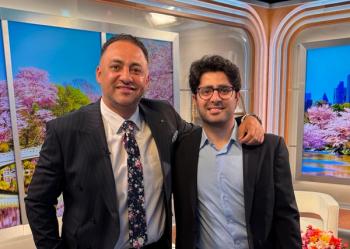
- Psychiatric Times Vol 29 No 7
- Volume 29
- Issue 7
A “Real” Psychiatrist
As the end of this psychiatrist's intern year approached, a chief resident told her that second year is the year “you really become a psychiatrist.”
As the end of my intern year approached, one of my chief residents told me that second year is the year “you really become a psychiatrist.” In our program, it is an outpatient year focused mainly on psychotherapy. He explained that it is a time for honing your personal style and learning to be comfortable setting boundaries.
“A real psychiatrist?” I was waiting (and hoping) to feel like one. I would have my own panel of outpatients, my own office, and no more overnight call, and I could focus on more than just electrolyte supplementation-I was on the verge of getting to practice the kind of psychiatry that had drawn me to the field in the first place. My excitement grew.
At first, psychotherapy was overwhelming-but I enjoyed the intellectual challenge and professional reward of feeling so connected to patients. I remember at times feeling unprepared for the intense emotions I encountered and feeling thankful at the end of the day when I returned home to my comparatively stable life.
The first few months were behind me, and I felt like I was about to hit my stride when my father passed away. My father was the kind of person who found real joy in everyday life-even when his life was filled with the pain from cancer that had spread to his bones. He looked at the world with a sense of wonderment that few have. He inspired me to see beauty in all things. He was my mentor on living a grateful life.
When I returned to work, I got a note from an attending that said, “Now you face one of the most difficult professional challenges-trying to heal yourself while working to heal others.” I was leery about what that challenge might entail, so like many who mourn, I put the card away and tried not to dwell on it.
I quickly discovered that learning psychotherapy was not a job that easily allowed for a 9 to 5 suppression of my grief. Every week it seemed one of my patients would discuss his or her own painful experience of a dying parent. My classmates would have lengthy discussions on parental figures and the role that loss plays in shaping people. Each day seemed filled with heartbreaking reminders of what I had lost. I started to resent therapy. It felt like a ball and chain, keeping me tied to my grief every day, preventing me from healing and moving on.
As the year dragged painfully on, Mr M came to me as a new patient. I had no idea that the day he came in seemingly determined to talk about his own father’s death 20 years earlier would be a turning point for me. He told me of how, the year before his father died, he had been very depressed-to the point of being suicidal. As his father grew sicker, my patient was able to open up to him on a new level, and they grew closer. My patient told me how he had always been the meekest of his siblings and that even though he had a speech impediment, he had given the eulogy when his father died. With a wistful smile, Mr M revealed that he found leadership and strength after his father’s death that he never knew he possessed. His family members leaned on him as they healed. He explained that paradoxically his father’s death led to a resolution of his depression and suicidal thoughts.
His optimism and unique perspective on his loss resonated deeply with me. It reminded me of my father’s ability to see the positive in even the most difficult situations. I realized I could choose to heal with gratitude instead of bitterness, just as my patient had done; it is what my father would have done and what he would have encouraged me to do all along.
Also, perhaps rather than resentment toward learning psychotherapy in the midst of personal adversity, I could find a deeper empathy for others who suffered as I did. I contemplated the note I received earlier in the year and the burden I felt at the thought of trying to heal others. What I had missed at the time was the possibility that my patients might help me heal with their own insights and experiences.
While grief has its ups and downs, that session with Mr M was a pivotal point for me. I’ve let go of feeling bitter, and I focus now on letting my father’s greatest life lesson live on through me-viewing life with a sense of wonderment.
As psychiatrists, we have the unique chance to see people for who they are, to see the beauty in their life story. I have learned to listen to my patients with a focus on finding that beauty. This can be therapeutic-for us both. This focus has taught me about myself, about life, about loss, and most of all, about healing. I know now that my anger last year wasn’t really about having to learn to provide therapy or to heal my patients. I had temporarily lost the ability to see the beauty in my own life.
Perhaps my experience parallels what we strive to do as psychiatrists. We listen, we learn, and we search for the bright spots in our patient’s lives. We use our sense of wonderment to see what even our patients may not. Then we wait with them. We wait until they are well enough, strong enough, to see again what we saw all along . . . the beauty in their story.
Now that I am strong enough, healed enough, and with my outpatient year behind me, I can’t help but wonder if understanding all this is much of what becoming a “real” psychiatrist is all about?
Articles in this issue
over 13 years ago
Narcissistic Personality Disorder: Rethinking What We Knowover 13 years ago
The Page Turnerover 13 years ago
FDA Panel Votes to Curtail Cranial Electrotherapy Stimulatorsover 13 years ago
Dr Nada Stotland Joins Our Editorial Boardover 13 years ago
Sex Orientation Change Therapy: Back in the Headlinesover 13 years ago
The Correlation Between Sleep-Disordered Breathing and Psychiatryover 13 years ago
The Role of Melatonin in the Circadian Rhythm Sleep-Wake CycleNewsletter
Receive trusted psychiatric news, expert analysis, and clinical insights — subscribe today to support your practice and your patients.







